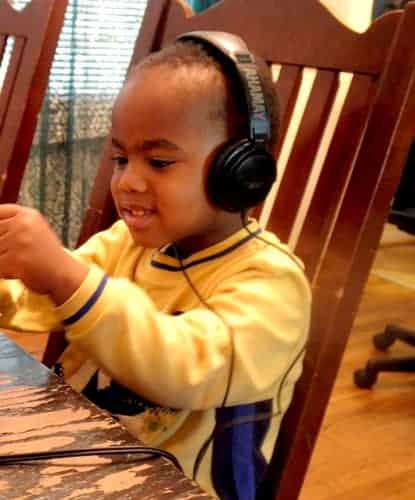Attention Deficit Hyperactivity Disorder
Have you explored, thought about, “What is distracting you?”
Definition of Attention Deficit Disorder is “a persistent pattern of inattention and hyperactivity-impulsivity that interferes with functioning or development, as characterized” by lack of attention that occurs in multiple environments; lasting longer than six months without traumatic episode; and consisting of both hyperactivity and impulsivity (American Psychiatric Association. (DSM V)
Need Help?
Cheri Moore supports emotional health while building an individualized intervention plan to improve your ability to respond and maintain progress after therapy.
“The brain does what it needs to develop and promote feelings of safety. Movement may be exactly what your child needs to stimulate the brain due to a deficit like a hidden hearing loss; chronic poor ear health, or visual processing difficulties.”
Sounds are Distracting
Background competing speech can distract attention, especially when heard louder and more clearly than speech. Likewise, sounds can be heard more loudly by one person than others.
An Illustration
Think about the loudness of running water. Then, add physically having your back turned to the person talking. The loudness of the running water covers up speech. Additionally, you are unable to subconsciously lip read. Both make it more difficult to listen with comprehension. Imagine feeling like this all day long, especially in a classroom.
Children whose vision blurs are unable to compensate because looking at a face that blurs and clears distracts the brain from listening.
Contrary to what most people believe, a weakness in the hearing system can make it much harder for the brain to turn down the volume of sounds, ignore irrelavant sounds.
With Cheri’s help you can understand confounding behaviors.
Auditory Integration Training Improves Attention
During auditory integration training, parents shared that their child’s behaviors became noticeably calmer with improved attention. However, hyperactivity increased once they finished their listening program.
Six months later after completion of the second listening program, parents and educators saw continuing improvements in attention and listening behaviors.
Researchers found that it takes time for auditory neural pathways to become strong enough to noticeably change behaviors. Berard-based Auditory Integration Training improves attention in those with a neurodevelopmental diagnosis like Attention Deficit Hyperactivity Disorder.

Testimony: Life Changing Success of Hearing Aids for CAPD
My testimony: life changing success of hearing aids for Central Auditory Processing Disorder (CAPD) and mild hearing loss helped my granddaughter finally excel. I pray that my testimony: Life Changing Success of Hearing Aids for Central Auditory Processing Disorder...
How I Found My Joy After Losing Almost Everything
How I found my joy after losing almost everything to mold may provide insights to improve your emotional health: Joy, Peace, Forgiveness, Self-Acceptance, and Love. Writing this blog made me think about the grief children endure who constantly experience the struggles...
A Mother’s Journey Into the World of Auditory Dyslexia
During the spring of 2007, I attended Dianne Craft’s conference where I learned that dyslexia affects the auditory processing center and the visual processing center. Perhaps I had found help for my daughter’s reading and spelling struggles. She was a gifted artist,...
Why Falling to the Ground and Giggling Felt Great!
I wondered and wondered why falling to the ground and giggling felt great for my young son until I worked with Cheri. Together we solves this puzzle. After Cheri's success with helping my older son, I decided to seek her advice regarding my younger son’s unclear, loud...
5 Free Priceless Gifts From The Heart
Valentine's week and throughout the year 5 free priceless gifts from the heart helps you give a gift that is remembered and valued more than anything else. When the gift comes from the heart, it may be purchased or created by the giver. To create a bit of fun, try to...
Movement Calms and Develops the Brain
The brain prompts you to move! Hyperactivity, movement, is seeking behavior giving the brain exactly what it needs for development and emotional health.
Researchers found that repetitive movements are calming and that stimulating movement energizes the brain increasing alertness.
A simplified explanation, vestibular play calms the brain by pushing stimulation in a predictable pattern to the brain. Thus, the next time you feel uptight or stressed, I encourage you to enjoy repetitious movement like,
- Steadily rock in a rocking chair
- Steadily swing on a porch swing
- Jump up and down
- Play hopscotch or jump rope
- Sit-ups, push-ups, jumping jacks, toe touches
Researchers found that vestibular activities benefitted physical and emotional health of college students. Deep pressure, sharing, and dietary changes also help improve stress hormonal functions.
(The Whole Brain Child, Trauma-Based Intervention—neurochemistry of fear)


The DSM V shares that without intervention children and teens with Attention Deficit Hyperactivity Disorder are at risk for:
- Mild language, motor, or social delays during childhood
- Emotional distress, behavioral problems, and social acceptance during the teen years
- Substance abuse, self-medicating, and suicide attempts during the teen years
According to the American Optometric Association, relying on vision screenings that only test for how well one sees, 20/20 vision, fails to provide accurate information concerning visual processing difficulties 63% to 73% of the time.
“The American Optometric Association (AOA) recommends that all children have a comprehensive eye exam (eye alignment, eyesight, eye health) by an eye doctor (optometrist) as opposed to a vision screening, before beginning first grade.“
“Undiagnosed and untreated vision disorders increase the potential for misdiagnosis of special needs and Attention Deficit Hyperactivity Disorder (ADHD), placing unnecessary stress on families and classrooms.” (https://www.aoa.org/patients-and-public/resources-for-teachers)

No Results Found
The page you requested could not be found. Try refining your search, or use the navigation above to locate the post.

Join Our Community!
Get tips on how to improve your health and learn through purposeful play delivered straight to your inbox.

Cheri Moore, B.S. Spec. Educ. Teacher, MSW, Certified Berard Practitioner since 2011